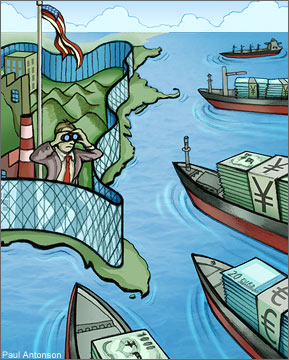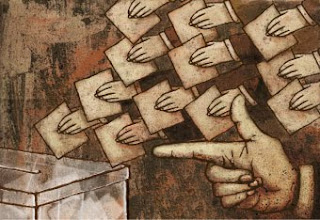En una charla del programa televisivo Democracy at Work sobre el tema "The cure for Capitalism", Richard D. Wolff, un conocido economista marxista de la Universidad de Massachusetts, basado en las teorías vertidas por él en su libro del mismo nombre, sugería a los sindicatos norteamericanos que en lugar de dejarse "chantajear" por las empresas poderosas que amenazan con trasladar sus fábricas y servicios a otros países con mano de obra barata, si los sindicatos se negaran a aceptar contratos con beneficios menores y salarios más bajos, podrían anular la amenaza con el argumento de que el sindicato organizaría entonces a los obreros y empleados de la empresa en una cooperativa que continuara fabricando el mismo producto o brindando los mismos servicios a precios más bajos que los anteriores.
Esta estrategia obligaría a recapacitar a la empresa que amenaza con trasladar sus empleos al extranjero (outsourcing) porque la cooperativa rival que surgiría en la plaza que abandona eliminaría la necesidad de mantener un alto margen de utilidades para satisfacer las exigencias de los accionistas. Los cooperativistas seguirían recibiendo los mismos salarios y beneficios que antes y la "plusvalía" que antes beneficiaba a los empresarios e inversionistas se aplicaría a rebajar los precios. En otras palabras, que la empresa se enfrentaría a una fuerte competencia ubicada en el mismo mercado que amenaza abandonar como empleador pero pretende conservar como proveedor.
Esto implica una improbable vigencia del desgastado concepto del "hombre nuevo", por el cual los empleados convertidos en cooperativistas no presionarían por mayores salarios y beneficios, ahora que ellos son los dueños, sino que procederían buenamente a bajar los precios.
El cooperativismo es muy útil y beneficioso en cualquier sociedad, pero no es el remedio para conservar empleos en un país frente a la competencia de mano de obra barata en otros países.
- Hits: 9286
 Evidentemente, está mal planteada la incógnita porque ninguna de estas alternativas basta para propiciar la democracia. El meollo de la cuestión está en el nivel cultural de la sociedad afectada por el autoritarismo y en la influencia que su cultura tiene en las nuevas generaciones dispuestas a avanzar hacia sistemas más respetuosos de los derechos y libertades de los ciudadanos.
Evidentemente, está mal planteada la incógnita porque ninguna de estas alternativas basta para propiciar la democracia. El meollo de la cuestión está en el nivel cultural de la sociedad afectada por el autoritarismo y en la influencia que su cultura tiene en las nuevas generaciones dispuestas a avanzar hacia sistemas más respetuosos de los derechos y libertades de los ciudadanos. The Economist introduced a book review titled "
The Economist introduced a book review titled "
